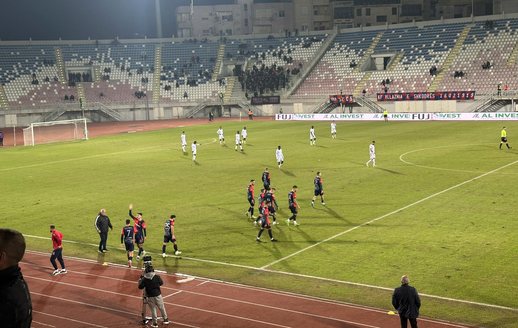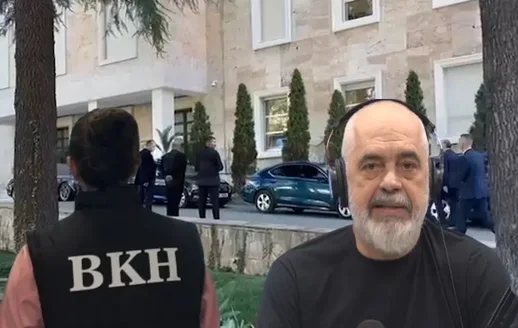
SPAÇI, THE CRIME THAT CANNOT BE RESTORED!


"I have written a film script at the request of director Namik Ajazi. It is rare in the world that two imprisoned authors make a film, the director and the screenwriter. The responsible institutions have been asked to finance a testimony, a work of art because we need to get rid of the monologue, from telling the same thing year after year, as Israel does with the Holocaust. The director has contacted the prime minister who has promised him, since the prison must be rebuilt to film, in this case, so to speak, one road and two jobs, Spaçi or Qafë Bari will be turned into a museum." During an interview for Ora e Betit, on May 23, 2023, where we remembered the two bloody revolts of Spaçi and Qafë Bari, the writer Visar Zhiti spoke to me for the first time about the project of a film dedicated to communist prisons in Albania.
What we did not know, not even the screenwriter Zhiti himself, was that this verbal agreement between Prime Minister Rama and director Ajazi became the genesis of a restoration intervention in Spaç, a second-category cultural monument. The denunciations with photos and footage by activist Arnen Sula, which spread rapidly on social networks, showed that one of the camp buildings had been plastered and painted white, while interventions worth over 100 thousand euros were planned in several other buildings that have escaped demolition, including the terrace of the appeal. These interventions made by the National Institute of Cultural Heritage, which in the name of restoration have damaged the historical memory in the most brutal communist camp in Albania, have been opposed by former political prisoners, civil society activists, architects and researchers as they risk deforming the past and manipulating it. The opposing reactions and a petition have raised the alarm not only about the lack of institutional transparency, but also because the interventions made without a public consultation and conservation plan are destroying the identity of this memory space.
Today, many former convicts of the communist regime and activists protested at Spaç prison in Mirdita.
Against the destruction of the history of the prison camp, in an effort to protect what remains of the living legend of the prisons, Fatos Lubonja said that the canteen and kitchen have already been destroyed, so no stone should be left unturned. Yesterday's reaction of the Minister of Economy, Culture and Innovation Gonxhe, instead of apologizing for the inappropriate intervention, spoke of "smoke", of a fabricated fable about "the corruption of memory and the Sancho Pancho of old politics. But apparently the minister deliberately "forgets" that at the forefront of the voices against this intervention are not two peripheral characters of Cervantes but two survivors of communist prisons like Visar Zhiti and Fatos Lubonja, without forgetting many others who have spoken out publicly. I would ask the minister to read Zhiti's article "Do not embellish hell" so that he could at least remain silent, not desecrating his pain! And I would have liked Mr. Ajazi to join this chorus.
Because in fact Spaçi is not just a camp with a few ruined buildings but a still open wound of Albanian society. It is the living memory of those who faced the violence of the totalitarian regime and a testimony that speaks with everything, with the walls, the cold cells, the barbed wire, the silence of those who did not come out of that hell alive. In a serious state, the restoration of such a place of memory would be done with transparency, with the participation of the victims, with dedication to preserving the authenticity of the pain it carries.
Painted white, one of the camp buildings where the intervention was carried out no longer bears any trace of the past as evidence of the suffering of hundreds of prisoners. “The watchtower,” as Fatos Lubonja ironically said, “resembles more a Hollywood product than the reality that he and hundreds of fellow sufferers have experienced for years.” "Not a single brick should be moved!" Dashamir Biçaku insisted with pain in my studio, during the show on this issue. "It was a prison, not a hotel," the family of a former convict told journalist Enkelejda Mema on Euronews. In fact, the terror of communism cannot be covered with plaster or painted with the paint of 2025. The past cannot be restored for the sake of a film project. In a place of pain and memory like Spaçi, this intervention is a second violation of the victims to make the crime acceptable. Today we risk forgetting not only the past, but also its meaning. Spaçi does not need decor, scenography and effects. Spaçi needs preservation and respect! Spaçi needs an immediate ban on any intervention until a comprehensive conservation plan is approved, where the few former political prisoners who are still alive and heritage specialists should have the last word.
Because Spaçi is not a movie scene. It is evidence of a crime. And a crime cannot be covered up, nor can it be restored!
Happening now...

America may withdraw from Europe, but not from SPAK
ideas


Who is the Surrel Rabbit?

The two wrong paths of the opposition with the Ombudsman
top
Alfa recipes
TRENDING 
services
- POLICE129
- STREET POLICE126
- AMBULANCE112
- FIREFIGHTER128
























